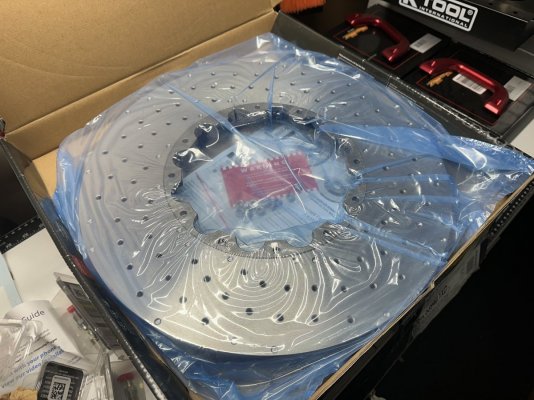tcm glx
Full Access Member
I put around 5K miles on this kit on my Gen 1, and it was a great improvement, will be doing to my Gen 3 as well….
Disclaimer: Links on this page pointing to Amazon, eBay and other sites may include affiliate code. If you click them and make a purchase, we may earn a small commission.
I done reading on this. Structural straight is fine. But the drilling of the holes cause micro fractures. Some expensive for foreign cars cast the holes in the rotors which help. Beveling of the holes also has provided some help. Still an issue. Interesting to me.
Likely a big difference in dimpled (cast) versus drilled. The DBA rings on my bench were for my ZL1 1LE. These are dimpled. BTW, this is what your garage becomes when you road race. You wait for rotors to go on sale in the winter and then buy 6 at a time. Terrible disease (road racing). I can quit whenever I want (is what I’ve been saying for 20 years). LOLYeah I was gonna say that if you cast the rotor with the holes, they are less prone to cracking. Drilling them, as you said, introduces micro cracks that if only really street drive, cause little issue - it's at the track where the issues become big bad and ugly.

Just because you find it impossible does not make it not true. I am not a physical or chemical metallurgist and i don't know a single one who tracks cars but none of them buy drilled rotors. Drilled rotors are marketed for looks and "Performance by allowing water an gasses to escape for better braking" Nascar, F1, IMSA, Michelin Pilot Challenge, Porsche Cup, Lamborghini Super Trofeo etc etc etc DO NOT USE the superior drilled rotors designed by engineers, they are either solid or slotted/hashed . I cannot tell you the number of drilled rotors i see on track weekends which have spider cracks STARTING from the holes. Hell I have had it happen to my OEM rotors before I switched to Slotted. Sure you see countless OEM drilled rotors from many High end manufactures (AMG, ///M, Porsche etc) STREET CARS but NOT on track cars.I’m no metallurgist (physical or chemical), but I find it impossible to believe that introducing a hole into an engineered piece of steel somehow makes it more reliable or stronger. Some engineer spent time designing that casting, forging it, testing it……..and then someone else just drilled a bunch of holes in it? Just my $.02

